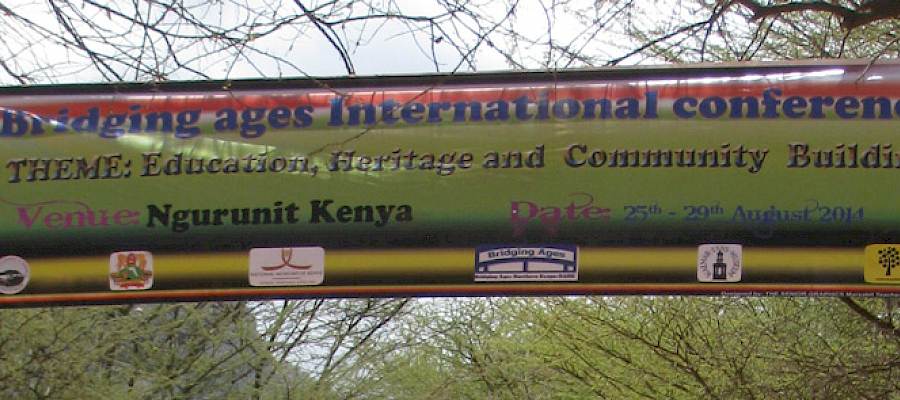Conference programme
Education, Heritage and Community Building
Bridging Ages Conference, Ngurunit, Kenya
Program
24 August
Delegates leave Nairobi, stay overnight in Isiolo
25 August
Arrival in Ngurunit, welcome, settle
26 August
09h00 Opening – Dr Wario, Cabinet Secretary for Sports, Culture and the Arts; Dr Yassin, Director General of National Museums of Kenya, Joseph Lekuton, MP
Dances, singing
10h00 Introduction, Bridging Ages Northern Kenya – Steven Labarakwe, Marsabit County Government
10h30 Bridging Ages all over the world and the Time Travel method – Ebbe Westergren, President of Bridging Ages
11h00 Tea
11h30 First session; Heritage, Environment and Community Building,
Introduction: Ebbe Westergren Moderator: Daniel Duba
Presenters: (1 hour): Njuguna Gichere and Lydia Kitungulu, National Museums of Kenya; Emma Angelin-Holmén, Kalmar County Museum, Sweden; Samson Semakula, Entebbe Municipality, Uganda; Agrita Ozola, Tukums museum, Latvia; Florence Indede, Maseno University, Kenya; Isacko Mamo, Department of Environment, Marsabit County Government
Workshop and group discussions (30 min)
13h00 Lunch
14h00 First session, second part
Presenters (1h20 min): Simon Gatheru, National Museums of Kenya; Örjan Molander, Kalmar County Museum, Sweden; Kaari Siemer, Tartu City Museum, Estonia; Adamu Mshelia, Nigeria; Bernard Busaka, Maseno University; Abigail Balie/ Andy Peterson, South Africa; Deborah Amukowa, Maseno University; Denis Ngala, TICAH, Kenya, Kitche Magak and Susan Kilonzo, Maseno University, Kenya; Kerstin Lönnberg and Mattias Lunn, Kalmar County Museum, Sweden
Workshop and group discussions (1 tim)
Conclusions (30 min, big papers on the board)
17h00 End
27 August
09h00 Preparation for the Time Travel, Ebbe Westergren & Jeremy Sarunye
09h30 Time Travel at a manyatta, “Stay or Leave” (story-telling, games, dances, weaving, necklaces, fencing, construction of a hut, smoking guards, drilling of fire, write advices)
12h00 Evaluation, questions
12h30 Lunch
13h30 Second session; Education and Community Building,
Introduction: Lena Westergren Moderator: Andrew Khale
Mathematics in the Historic Environment (50 min): Lena Westergren and Berit Roos Johansson, Linnaeus University, Sweden; Mueni Kiio, Mary Nasibi and David M. Malonza, Kenyatta University, Kenya; Andrew Khale, Ngurunit Primary School; Phoebe Awiiti, Kisumu museum, Kenya; Lotta Rautio, Charles Wretman, Södermöre School and Tina Lindström, Kalmar County Museum, Sweden
Education and Community Building:
Presenters (45 min): Thandeka Sibiya, Mpophomeni, South Africa; Gulshera Khan and Judy Mkhize, Port Shepstone, South Africa; Nancy Masasabi, Maseno University; Henry Ayot and Samson Ondigi, Kenyatta university; Grace Mitambo, Department of Education, Marsabit County Government.
Workshop and group discussions (1 hour)
Conclusions (30 min, big papers on the board)
17h00 End
Evening: Surprise, Andrew Kahle
28 August
09h00 Short conclusion from yesterday
Third session; Education, Heritage and Conflict Resolution,
Introduction and Moderator: Steven Labarakwe
Presenters (50 min): Joseph Mirgichan, Marsabit County Government; John Rigano, National Museums of Kenya; Annina Ylikoski, Children’s Network BARK, Finland; Jabulani Phelago, Freedom Park, South Africa; Mary Nasibi and Peter Lemoosa, Kenyatta University, Kenya
Workshop and group discussions (45 minutes)
Conclusions (15 minutes, big papers on the board)
11h00 Tea
11h30 Solutions, achievements, way forward
Closing of the conference, Ukur Yatani, Governor of Marsabit County
Vote of thanks
Next Bridging Ages conference
13h00 Lunch and Market
14h00, until the evening: Big Cultural Festival with Ngurunit Community and other tribes from Northern Kenya: performances, dances, singing etc
29 August
A day in Ngurunit
Possible tours (am and/or pm): Visit a manyatta; Walk the mountains; Camel ride; Visit the blacksmith; Natural swimming pool…
Evening: Camp fire
30 August
Leave for Nairobi
Questions for the presentations and group discussions
Heritage, Environment and Community Building
1. How can we use local heritage in developing communities? Socially, economically, physically?
1b Is establishing local Heritage Centers in communities a good idea? What would be the role of those Heritage Centers? For community members, schools, tourists? Recording sites and stories, events, Time Travels?
2. What support is needed from heritage and educational organizations?
3. How can the community be engaged in a sustainable landscape?
Education and Community Building
1. How can we use local heritage and local experiences in education, for example in Mathematics and History, on a regular basis?
What support is needed from other organizations? How do we develop the tools?
2. What are the benefits – for the school, for the community? Challenges?
Education, Heritage and Conflict Management
1. Heritage can help us manage conflicts but it can also fuel or preserve conflicts.
How do we use cultural heritage and local knowledge in preventing and resolving conflicts? What is the role of my organization?
Welcome!
Steven Labarakwe, Bridging Ages Northern Kenya, BANK
Ebbe Westergren, Bridging Ages International
- 2022 Turkey
- 2019 Estonia
- 2018 South Africa
- 2017 Finland
- 2016 Sweden
- 2015 Ireland
- 2014 Kenya
- Even more photos from the conference
- Updated: Swedish Exhibition Agency videos from the 2014 BA conference
- More photos from the conference
- International conference 2014
- Call for papers
- Ngurunit conference, a chance of a life time.
- Invitation: Education and Community Building, Learning in the Local Environment
- ”Education and Community Building" - Conference 2014
- Karibu Kenya Welcome to Kenya!
- Registration is open! Bridging Ages 2014 Conference
- Conference programme
- Abstracts from the conference
- Comments from delegates of the Bridging Ages Conference in Ngurunit 26-29 August 2014
- Photos from the conference
- Declaration from the Bridging Ages Conference in Ngurunit 2014
- Education and Community Building Mathematics in the Historic Environment
- Mathematics and History together Time Travels at Kisumu Railway Station, Kenya
- Comments from the Ngurunit conferenece
- 2013 USA
- 2012 Turkey
- 2011 Estonia
- 2010 Sweden
- 2009 Finland
- 2008 South Africa
- 2007 Latvia
- 2006 Italy
- 2004 Sweden



